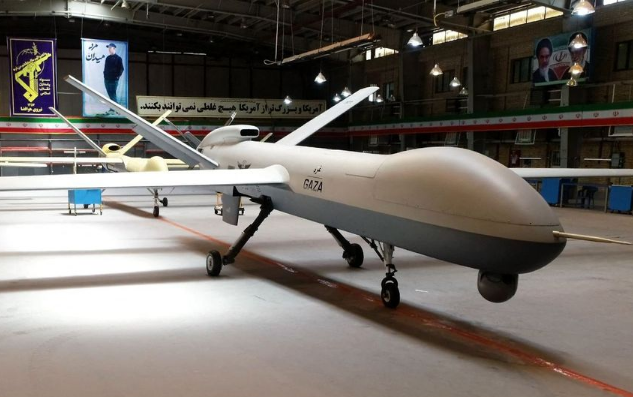The Biden administration levied sanctions against several Iranian companies and their executives whom the U.S. has linked to Tehran’s effort to develop armed drones for attacks on U.S. forces and allies.
The administration’s action on Friday marks the start of a campaign against Iran’s evolving unmanned aerial vehicle and precision-guided missile programs, which Western officials say represent a more immediate threat than Iran’s nuclear-enrichment and ballistic-missile programs.
“Iran’s proliferation of UAVs across the region threatens international peace and stability,” said Wally Adeyemo, deputy secretary of the Treasury. “Treasury will continue to hold Iran accountable for its irresponsible and violent acts.”
Iran’s Foreign Ministry spokesman Saeed Khatibzadeh condemned the U.S. Treasury’s action, calling it “a continuation of the Trump administration’s failed policy of maximum pressure.”
“A government that talks of returning to the nuclear deal but follows in the footsteps of former U.S. president Donald Trump sends the message that it is not trustworthy,” Mr. Khatibzadeh said in a statement.
The sanctions target two Iranian companies the U.S. said procure drone engines and other components for the Islamic Revolutionary Guard Corps, a military unit designated by Washington as a terror group for its financial, logistical and intelligence support of militants in the region. The Treasury said it also blacklisted an IRGC brigadier general involved in the drone program and two men who conducted work for the companies, including buying parts from overseas.
The sanctions, imposed under powers for countering terrorism and proliferation of weapons of mass destruction, freeze any assets the targets have within U.S. jurisdiction. They also can make it more difficult for the firms to purchase foreign parts.
Iran increasingly relies less on foreign-sourced parts, however, after the government ordered its military leaders to boost its drone arsenal, according to state media reports. Domestic production has since grown, U.S. analysts say.
An academic paper published by Iran’s Supreme National Defence University in 2018 said the country should make production of drones a strategic priority, seeing that as an efficient way to boost the Iranian military’s combat capabilities.
Behnam Ben Taleblu, a senior fellow at the Washington-based Foundation for Defense of Democracies, said Friday’s action is “a necessary but not sufficient step towards responding to the drone attacks in Iraq and Syria, as well as impeding Iran’s spectrum of unmanned aerial threat.” The foundation advocated for tougher sanctions under the Trump administration and has criticized the Biden administration’s decision to try to rejoin the 2015 multilateral nuclear accord.
Negotiations with Iran over the 2015 nuclear deal, from which former President Donald Trump withdrew in 2018, have stalled largely around the issue of sanctions.
Tehran wants all sanctions lifted, but the Biden administration has said it would lift only those imposed against the economic sectors that it says aren’t tied to terror or weapons programs.
The U.S. and its allies have blamed Iran and its proxies for drone attacks on U.S. forces and regional allies, including against a U.S. base in Syria last week, and against strategic energy infrastructure and international shipping.
Western defense officials say Tehran’s rapidly developing ability to build and deploy drones is changing the security equation in a region already on edge.
Iran’s precision-strike capabilities came to the fore in 2019 when a drone attack shut half the crude-oil output of Saudi Arabia—the world’s biggest oil exporter. The U.S. blamed Tehran. Saudi Arabia, a longtime adversary of Iran, has been attacked more than 100 times in recent months by ballistic missiles, unmanned aerial systems, small drones and cruise missiles fired by Iranian proxies in Yemen, U.S. officials have said.
And U.S.-ally Israel is concerned that Hezbollah, which is backed by Iran, could use its maturing precision-strike capabilities to hit critical domestic targets from its base in neighboring Lebanon. Iranian drone technologies were also used by Islamist group Hamas against Israel during their short conflict in May, Israeli officials and security analysts said.








































admin in: How the Muslim Brotherhood betrayed Saudi Arabia?
Great article with insight ...
https://www.viagrapascherfr.com/achat-sildenafil-pfizer-tarif/ in: Cross-region cooperation between anti-terrorism agencies needed
Hello there, just became aware of your blog through Google, and found ...